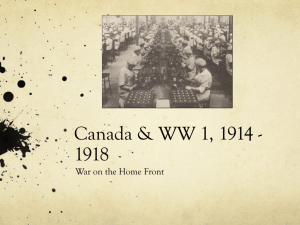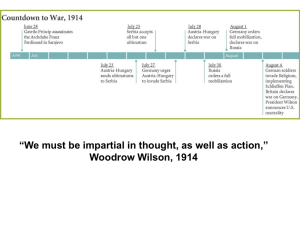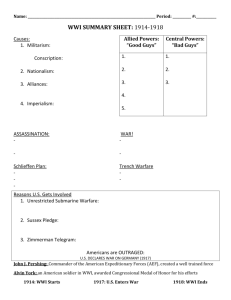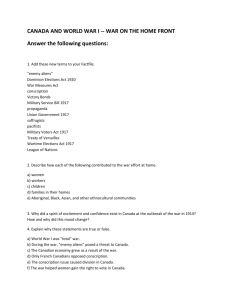Station 1: Building up the Military
advertisement
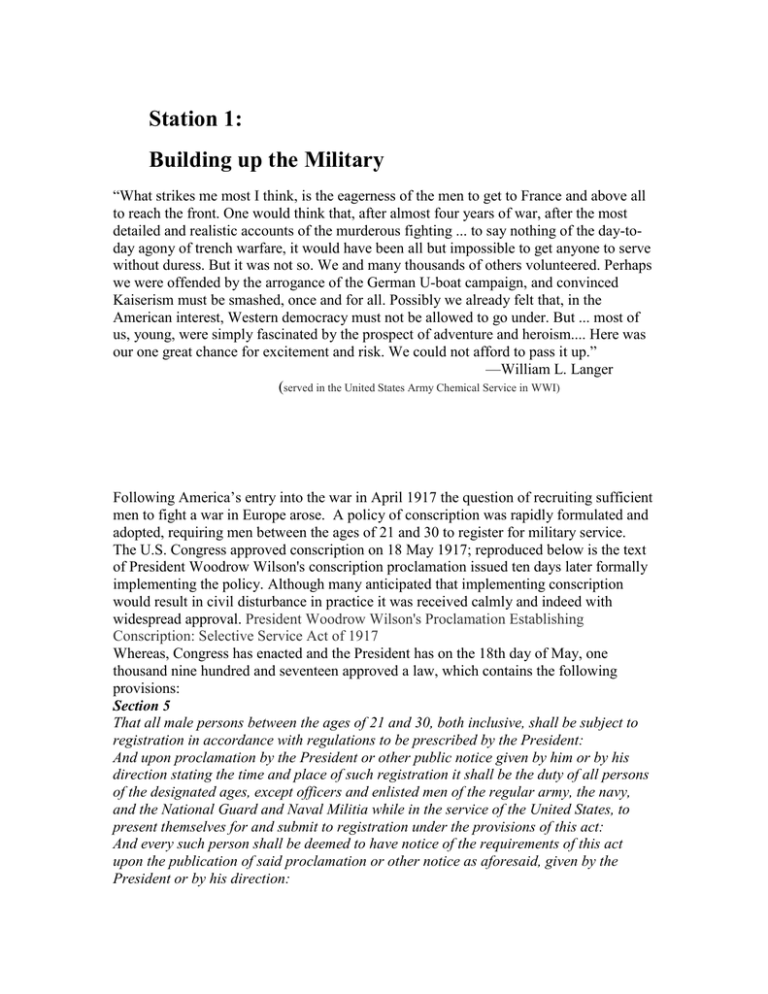
Station 1: Building up the Military “What strikes me most I think, is the eagerness of the men to get to France and above all to reach the front. One would think that, after almost four years of war, after the most detailed and realistic accounts of the murderous fighting ... to say nothing of the day-today agony of trench warfare, it would have been all but impossible to get anyone to serve without duress. But it was not so. We and many thousands of others volunteered. Perhaps we were offended by the arrogance of the German U-boat campaign, and convinced Kaiserism must be smashed, once and for all. Possibly we already felt that, in the American interest, Western democracy must not be allowed to go under. But ... most of us, young, were simply fascinated by the prospect of adventure and heroism.... Here was our one great chance for excitement and risk. We could not afford to pass it up.” —William L. Langer (served in the United States Army Chemical Service in WWI) Following America’s entry into the war in April 1917 the question of recruiting sufficient men to fight a war in Europe arose. A policy of conscription was rapidly formulated and adopted, requiring men between the ages of 21 and 30 to register for military service. The U.S. Congress approved conscription on 18 May 1917; reproduced below is the text of President Woodrow Wilson's conscription proclamation issued ten days later formally implementing the policy. Although many anticipated that implementing conscription would result in civil disturbance in practice it was received calmly and indeed with widespread approval. President Woodrow Wilson's Proclamation Establishing Conscription: Selective Service Act of 1917 Whereas, Congress has enacted and the President has on the 18th day of May, one thousand nine hundred and seventeen approved a law, which contains the following provisions: Section 5 That all male persons between the ages of 21 and 30, both inclusive, shall be subject to registration in accordance with regulations to be prescribed by the President: And upon proclamation by the President or other public notice given by him or by his direction stating the time and place of such registration it shall be the duty of all persons of the designated ages, except officers and enlisted men of the regular army, the navy, and the National Guard and Naval Militia while in the service of the United States, to present themselves for and submit to registration under the provisions of this act: And every such person shall be deemed to have notice of the requirements of this act upon the publication of said proclamation or other notice as aforesaid, given by the President or by his direction: And any person who shall wilfully fail or refuse to present himself for registration or to submit thereto as herein provided shall be guilty of a misdemeanour and shall, upon conviction in the District Court of the United States having jurisdiction thereof, be punished by imprisonment for not more than one year, and shall thereupon be duly registered; provided that in the call of the docket precedence shall be given, in courts trying the same, to the trial of criminal proceedings under this act; provided, further, that persons shall be subject to registration as herein provided who shall have attained their twenty-first birthday and who shall not have attained their thirty-first birthday on or before the day set or the registration; and all persons so registered shall be and remain subject to draft into the forces hereby authorized unless excepted or excused therefrom as in this act provided; provided, further, that in the case of temporary absence from actual place of legal residence of any person liable to registration as provided herein, such registration may be made by mail under regulations to be prescribed by the President. As the military prepared for war in 1917, it raced a severe shortage of clerical workers because so many men were assigned to active duty. Early in 1917, the navy authorized the enlistment of women to meet its clerical needs. By the end of the war, over 11,000 women had served in the navy. Although most performed clerical duties, others served as radio operators, electricians, pharmacists, and photographers. The army still did not enlist women. Instead, it hired them as temporary clerical workers. The only women to actually serve in the army were in the Army Nursing Corps. Army nurses were the only women in the military sent overseas during the war. Over 20,000 nurses served in the army during the war, including more than 10,000 overseas. Station Questions: 1. Were all service men drafted during WWI? What was the reasoning for these young men to serve their country according to William L. Langer? 2. Do you believe our government has the right to conscript (draft) young men into the army during wartime? Why or why not? List your reasons. 3. How did the idea of women’s roles in society change during WWI? Station 2: Organizing Industry "Wars are fought and won — or lost — on the land, on the water, in the air, and on those battle lines behind the front where the civilian forces stand. It is not enough to mobilize the Nation's military strength. There must be a mobilization of her full economic resources — industrial, agricultural and financial. These must be organized, coordinated, and directed with the same strategy that governs the operations of the purely military arms of service. The prodigious strain upon the world's productive capacity must be met and balanced to provide the means of warfare and to maintain the civilian population as well as to preserve the economic fabric. America to-day is the chief source of strength to the forces engaged in the conflict against German world domination. That strength is expressed in terms of man power and material — the one military, and the second industrial. To control and regulate industry in all its direct and indirect relations to the war and to the Nation, the President has created the War Industries Board and placed the responsibility for its operation in the hands of the chairman. The letter of March 4, 1918, addressed to Bernard M. Baruch, and the proclamation of May 28, 1918, delegating executive powers, follow: The War Industries Board is charged with the duty of procuring an adequate flow of materials for the two great war-making agencies of the Government — the War and Navy Departments— and for the two agencies in immediate affiliation with these military arms — the Emergency Fleet Corporation and the Railroad Administration. Also, the board provides supplies necessary to the military needs of our associations in the war…” -A report of the War Industries Board by Bernard Baruch President Woodrow Wilson also created the Food Administration, to help produce and conserve food. Wilson didn’t want to ration (limit) food so he called on people to observe the specific days: “meatless, sweetless, wheatless, porkless” days. People began to plant “Victory Gardens” in their yards so their families would have enough to eat and wouldn’t have to buy produce that could go to the soldiers. The government would raise money for the war through increasing taxes through a progressive tax (which taxed high incomes at a higher rate than low incomes). The rest was raised through Liberty Bonds and Victory Bonds. By buying the bonds, Americans were loaning the government money. The government agreed to repay the money with interest in a specified number of years. Station Questions: 1. What role do you think the leaders of industry play in the War Industries Board? What were the pros and cons of having these men in such positions of power? 2. How did the Food Administration convince Americans to make sacrifices and change their way of living during World War I? 3. Liberty and Victory bonds were a way to help pay for the war. Brainstorm and make a list of other ways you would suggest to help pay for the war. Station 3: Mobilizing the Workforce "It was very important to them that they were actually supporting the war effort, although lots of them didn't really think much about what the war was about. They knew that their friends, relations, husbands, sons were abroad. They were dying. There was a shell shortage. And they felt they really could do something to support the war effort. It was very exciting for a lot of them. The whole atmosphere of the war was also quite different from earlier wars. Its scale meant that it affected food supplies. It affected supplies of all kinds of goods in this country. It was quite obvious that women had to fulfill a new role in all sorts of jobs or the war couldn't have been fought. I think the way they actually coped with the fact they were making weapons of death varied from woman to woman. Some of them just cut it off from their home experience. They didn't want to think about it. Others actually felt they were making things that would bring the war to a close much faster." Braybon, Gail. Women Workers in the First World War. 1st ed. Vol. 1. Chicago: Routledge, 1981. 72. Print. ________________________________________________ Station Questions: 1. What do you think was the purpose for the establishment of the National War Labor Board based on the poster? 2. Do you think these workplace advancements for women were permanent changes? Station 4: Ensuring Public Support A new government agency the Committee on Public Information had the task of “selling” the war the American people. The U.S.A. entered World War One in April 1917, but lost no time in producing many more propaganda posters than any other single nation. These encompassed recruitment to the various armed services, plus - frequently - the raising of war finance via the hugely successful liberty bond issues. Station Questions: 1. In your opinion, is Debs or Scheck patriotic or anti-American? Why or why not. 2. Do you think the Sedition Act was necessary? Why or why not? Use evidence to support your answer

